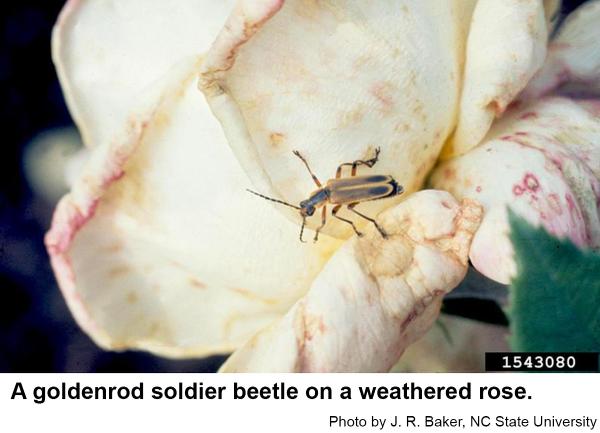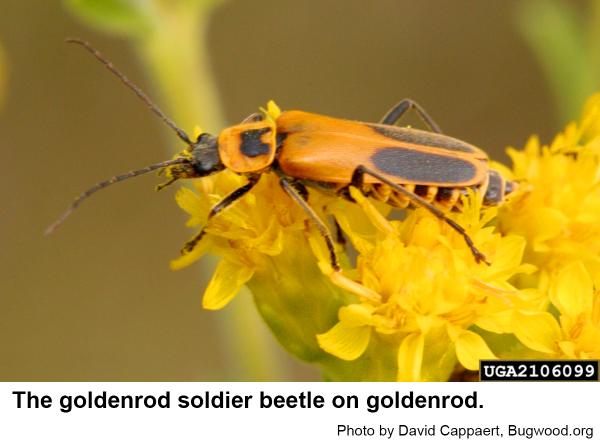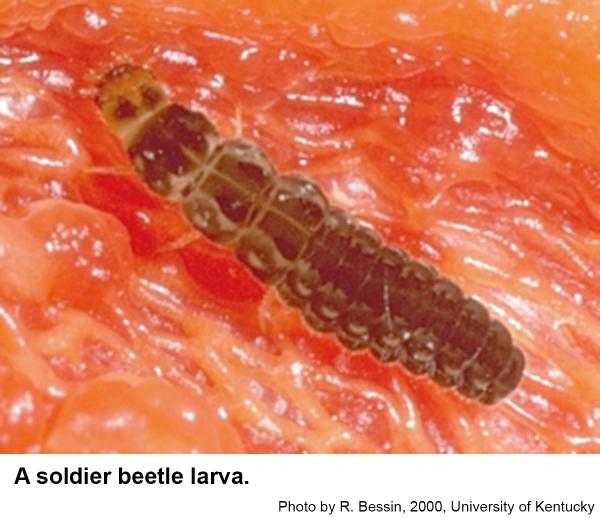Description and Biology
Goldenrod soldier beetles, Chauliognathus pensylvanicus, are also called Pennsylvania leatherwings. They are often abundant on goldenrod, roses and other flowers. They are our most common soldier beetles in North Carolina. These beetles are almost 3/4 inch long and have unusually soft and flexible thickened front wings that cover the hindwings. The front wings meet in a straight line but don't quite cover the end of the abdomen. Each front wing is orange with a large black spot at the tip and the thorax has a central large black spot. The head of goldenrod soldier beetle is visible with its chewing mouthparts and long, straight antennae. Soldier beetles are considered to be beneficial insects, although at times their presence on flowers may cause some concern. These beetles feed on pollen or on aphids and other plant pests. Females lay eggs in soil or leaf litter. Soldier beetle larvae feed on caterpillars and other hapless insects they encounter as they crawl about. Larvae are slender and usually dark. Also soldier beetle larvae tend to be terrestrial although they do climb plants sometimes. Adult soldier beetles vaguely resemble lightning beetles but soldier beetles do not have the light producing apparatus on the lower abdomen. These beetles are common during the summer, especially in August.
Host Plants
Although these beetles eat pollen and nectar, they do not chew on flower petals. Goldenrod soldier beetles are predatory and consume small caterpillars, grasshopper eggs, aphids, and other soft-bodied insects.
Residential Recommendations
Since goldenrod soldier beetles feed on aphids and other insects they find on plants, and since they do not seem to chew on petals, these beetles should be encouraged rather than eliminated.
References
- Family Cantharidae - Soldier Beetles, Cantharinae. Anonymous. 2016. BugGuide, Iowa State University Department of Entomology.
- Know your native pollinators: Goldenrod soldier beetle. Dietz, J. No Date. Florida Wildflower Foundation.
- Soldier Beetles. Newton, B. 2006. University of Kentucky Department of Entomology - Kentucky Critter Files, Critter Files/Insects/Beetles/Soldier Beetles.
- Extension Plant Pathology Publications and Factsheets
- Horticultural Science Publications
- North Carolina Agricultural Chemicals Manual
For assistance with a specific problem, contact your local Cooperative Extension Center.
This Factsheet has not been peer reviewed.
Publication date: Aug. 3, 2016
Reviewed/Revised: May 12, 2021
N.C. Cooperative Extension prohibits discrimination and harassment regardless of age, color, disability, family and marital status, gender identity, national origin, political beliefs, race, religion, sex (including pregnancy), sexual orientation and veteran status.



